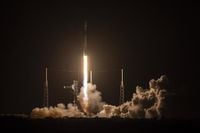South Korea has successfully launched its fourth domestically developed military reconnaissance satellite from a U.S. space base in Florida, marking a significant step in its strategy to enhance independent surveillance capabilities over North Korea. The satellite, equipped with Synthetic Aperture Radar (SAR), was launched aboard a SpaceX Falcon 9 rocket from Cape Canaveral Space Center at 20:48 local time on Monday, April 21, 2025. It reached orbit approximately 15 minutes later, at 21:03.
The Defense Ministry of South Korea announced that the satellite made its first communication with a ground station 56 minutes after launch, confirming that it was functioning normally. This successful deployment is part of a broader plan by South Korea to establish a constellation of five military reconnaissance satellites by the end of 2025, aiming to bolster its monitoring of North Korean military activities and reduce reliance on U.S. intelligence.
South Korea's first spy satellite was launched in December 2013, followed by two additional satellites in 2024. The constellation being developed includes satellites equipped with electro-optical and infrared sensors, as well as synthetic aperture radar, which allows for high-definition imaging under various weather conditions.
The launch of this fourth satellite is pivotal for South Korea, as it seeks to improve national security and enhance its capacity to monitor threats from North Korea. With the completion of the Project 425 program, which oversees the military observation satellites, South Korea aims to achieve a more autonomous and precise surveillance capability.
According to the Korean Defense Ministry, the successful launch signifies a new level of progress in South Korea's defense strategy, particularly in the face of ongoing tensions with North Korea. The country has historically depended on U.S. satellite imagery for its intelligence needs, but this new capability is expected to provide Seoul with timely and accurate data regarding North Korean military movements.
As part of its efforts to foster a more independent defense posture, South Korea has made significant investments in its space and defense technologies. The fourth satellite launch represents not only a technological achievement but also a strategic shift towards self-reliance in national security matters.
With the growing concerns over North Korea's military ambitions, including its missile tests and nuclear program, the ability to monitor these activities closely is increasingly crucial for South Korea. The SAR satellite can provide continuous surveillance, irrespective of weather conditions, thus enhancing the South Korean military's operational readiness.
The completion of the five-satellite constellation is expected to be finalized within the next few months, with the fifth and final satellite scheduled for launch by the end of 2025. This ambitious project underscores South Korea's commitment to advancing its defense capabilities and ensuring the safety of its citizens amid regional threats.
In summary, the successful launch of South Korea's fourth military reconnaissance satellite marks a pivotal moment in its defense strategy. With plans to deploy a total of five satellites, South Korea is positioning itself to enhance its surveillance capabilities and reduce its dependency on foreign intelligence, particularly from the United States. This development not only reflects advancements in technology but also highlights the importance of national security in an increasingly volatile region.





